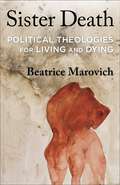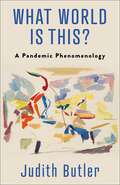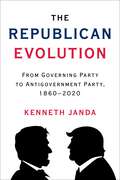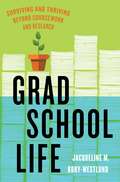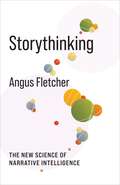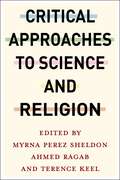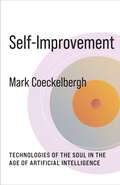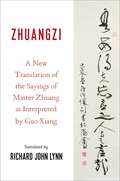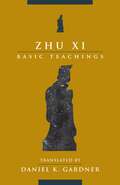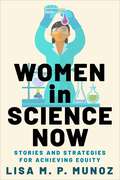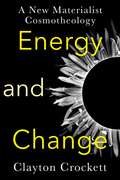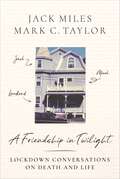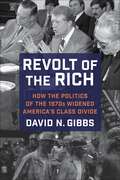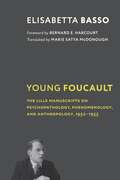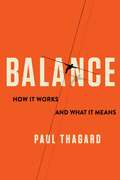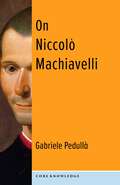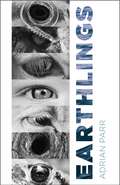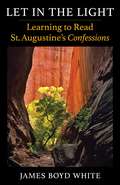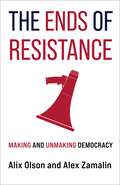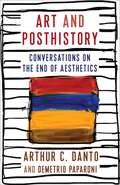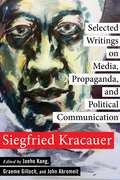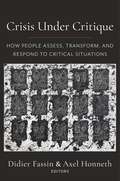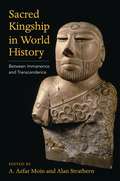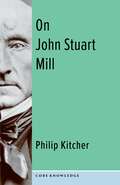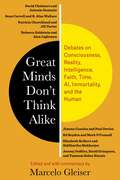- Table View
- List View
Sister Death: Political Theologies for Living and Dying
by Beatrice MarovichLife and death are commonly seen as representing the starkest of binaries: Death is the ultimate adversary of all that lives. Beatrice Marovich argues that such understandings of mortality have been deeply influenced by a strain of Christian political theology that has left its mark on both religious and secular narratives. Adapting the figure of “Sister Death” from Saint Francis of Assisi, she calls for recognizing that life and death are family.Drawing on a wide range of sources—from Toni Morrison to Jacques Derrida, psychoanalysis to grassroots “death positive” movements—Marovich critiques a racialized political theology that pits life and death against each other in a state of endless war. In a time of extinctions, it is necessary to disrupt this dominant story in order to apprehend death as a collective, multispecies event. Sister Death proposes an alternative view in which life and death are not mortal enemies destined for mutual destruction. Instead, they are engaged in a contested, tense, and sometimes mutually empowering form of connection—a sisterhood.Eloquent and approachable, this book deftly integrates the insights of a number of disciplines to provide a profound reconsideration of the relations between life and death. Sister Death also features a series of original works by the artist Krista Dragomer that stage an ongoing conceptual conversation with the text.
What World Is This?: A Pandemic Phenomenology
by Judith ButlerThe pandemic compels us to ask fundamental questions about our place in the world: the many ways humans rely on one another, how we vitally and sometimes fatally breathe the same air, share the surfaces of the earth, and exist in proximity to other porous creatures in order to live in a social world. What we require to live can also imperil our lives. How do we think from, and about, this common bind?Judith Butler shows how COVID-19 and all its consequences—political, social, ecological, economic—have challenged us to reconsider the sense of the world that such disasters bring about. Drawing on the work of Max Scheler, Maurice Merleau-Ponty, and critical feminist phenomenology, Butler illuminates the conditions in which we seek to make sense of our disorientation, precarity, and social bonds. What World Is This? offers a new account of interdependency in which touching and breathing, capacities that amid a viral outbreak can threaten life itself, challenge the boundaries of the body and selfhood. Criticizing notions of unlimited personal liberty and the killing forces of racism, sexism, and classism, this book suggests that the pandemic illuminates the potential of shared vulnerabilities as well as the injustice of pervasive inequalities.Exposing and opposing forms of injustice that deny the essential interrelationship of living creatures, Butler argues for a radical social equality and advocates modes of resistance that seek to establish new conditions of livability and a new sense of a shared world.
The Republican Evolution: From Governing Party to Antigovernment Party, 1860–2020
by Kenneth JandaThe Republican Party was founded in 1854 to oppose slavery and its spread to new territories and states. Today, under the sway of Donald Trump, it is hardly recognizable as the party of Lincoln or even the party of Eisenhower. How and why has the Republican Party changed so drastically?Kenneth Janda sheds new light on the Republican Party’s transformations, drawing on a wide range of quantitative and qualitative evidence. He examines nearly three thousand planks from every Republican platform since 1856 as well as candidate statements and historical sources, tracing the evolution of the party’s positions on topics such as states’ rights, trade, taxation, regulation, law and order, immigration, environmental protection, and voting rights. Janda argues that the GOP has gone through three main phases over the course of its history, transforming from a party committed to governance to one vehemently opposed to government. In its first several decades, the Republican Party emphasized national authority and economic development. By the late 1920s, Republicans had begun downplaying the role of government in favor of a new philosophy steeped in free markets. The nomination of Barry Goldwater in 1964 marked a key turning point. Since then, the party has endorsed states’ rights, opposed civil rights, and become increasingly ethnocentric. Richly documented with scores of figures and tables, The Republican Evolution offers new perspective on how the GOP became an antigovernment party—and whether it can step back from the brink of authoritarianism.
Grad School Life: Surviving and Thriving Beyond Coursework and Research
by Jacqueline M. Kory-WestlundGrad school isn’t easy. It’s even less easy when you’re also managing a second job, a family, or depression—or when you are a first-generation student, or if you come from an underrepresented group or a lower socioeconomic-status background. Grad students are overworked, overstressed, and over it.Most grad school advice books focus on the professional side: finding funding, managing research and teaching, and applying for academic jobs. But students today face a difficult job market. Only a handful will obtain coveted tenure-track professorships, so they need alternative career prep. Plus, grad school is only one part of your life. And with an average age of 33 years, today’s students are juggling far more than school.That’s where this book comes in. It will help you keep up a personal life, make the most of your time, and prepare for your career—whether in academia or beyond. This pragmatic book explains how to persevere through the grad school long haul, covering challenges both on and off campus. It shares candid, specific advice on personal finances, mental health, setting your own learning and career goals, maintaining friendships and relationships, and more.Peppy, sensible, and smart, Grad School Life points out the pitfalls of academia and helps you build the life you want. With fresh insights, concrete suggestions and exercises, and helpful lists of resources, this book gives grad students a new roadmap for not only surviving but thriving—both in school and in the real world.
Storythinking: The New Science of Narrative Intelligence (No Limits)
by Angus FletcherEvery time we think ahead, we are crafting a story. Every daily plan—and every political vision, social movement, scientific hypothesis, business proposal, and technological breakthrough—starts with “what if?” Linking causes to effects, considering hypotheticals and counterfactuals, asking how other people will react: these are the essence of narrative. So why do we keep overlooking story’s importance to intelligence in favor of logic?This book explains how and why our brains think in stories. Angus Fletcher, an expert in neuroscientific approaches to narrative, identifies this capacity as “storythinking.” He demonstrates that storythinking is fundamental to what makes us human. Artificial intelligence can perform symbolic logic, rational deduction, and mathematical calculation, but it is incapable of deliberating in narrative. Drawing on new research in neuroscience and narrative theory, Fletcher explores the nature of imagination, innovation, and creativity. He provides concise answers to big questions: How does storythinking work? Why did it evolve? How can it misfire? What problems can it solve?Revealing the significance of storythinking from science to business to philosophy, this book also provides ways for readers to harness its power to script better tomorrows.
Critical Approaches to Science and Religion
by Sheldon, Myrna Perez; Ragab, Ahmed; Keel, TerenceCritical Approaches to Science and Religion offers a new direction for scholarship on science and religion that examines social, political, and ecological concerns long part of the field but never properly centered. The works that make up this volume are not preoccupied with traditional philosophical or theological issues. Instead, the book draws on three vital schools of thought: critical race theory, feminist and queer theory, and postcolonial theory. Featuring a diverse array of contributors, it develops critical perspectives by examining how histories of empire, slavery, colonialism, and patriarchy have shaped the many relationships between science and religion in the modern era. In so doing, this book lays the groundwork for scholars interested in speaking directly to matters such as climate change, structural racism, immigration, health care, reproductive justice, and sexual identity.
Self-Improvement: Technologies of the Soul in the Age of Artificial Intelligence (No Limits)
by Mark CoeckelberghWe are obsessed with self-improvement; it’s a billion-dollar industry. But apps, workshops, speakers, retreats, and life hacks have not made us happier. Obsessed with the endless task of perfecting ourselves, we have become restless, anxious, and desperate. We are improving ourselves to death. The culture of self-improvement stems from philosophical classics, perfectionist religions, and a ruthless strain of capitalism—but today, new technologies shape what it means to improve the self. The old humanist culture has given way to artificial intelligence, social media, and big data: powerful tools that do not only inform us but also measure, compare, and perhaps change us forever.This book shows how self-improvement culture became so toxic—and why we need both a new concept of the self and a mission of social change in order to escape it. Mark Coeckelbergh delves into the history of the ideas that shaped this culture, critically analyzes the role of technology, and explores surprising paths out of the self-improvement trap. Digital detox is no longer a viable option and advice based on ancient wisdom sounds like yet more self-help memes: The only way out is to transform our social and technological environment. Coeckelbergh advocates new “narrative technologies” that help us tell different and better stories about ourselves. However, he cautions, there is no shortcut that avoids the ancient philosophical quest to know yourself, or the obligation to cultivate the good life and the good society.
Zhuangzi: A New Translation of the Sayings of Master Zhuang as Interpreted by Guo Xiang (Translations from the Asian Classics)
by Richard John LynnThe Zhuangzi (Sayings of Master Zhuang) is one of the foundational texts of the Chinese philosophical tradition and the cornerstone of Daoist thought. The earliest and most influential commentary on the Zhuangzi is that of Guo Xiang (265–312), who also edited the text into the thirty-three-chapter version known ever since. Guo’s commentary enriches readings of the Zhuangzi, offering keen insights into the meaning and significance of its pithy but often ambiguous aphorisms, narratives, and parables.Richard John Lynn’s new translation of the Zhuangzi is the first to follow Guo’s commentary in its interpretive choices. Unlike any previous translation into any language, its guiding principle is how Guo read the text; Lynn renders the Zhuangzi in terms of Guo’s understanding. This approach allows for the full integration of the text of the Zhuangzi with Guo’s commentary. The book also features a translation of Guo’s complete interlinear commentary and is annotated throughout.A critical introduction includes a detailed account of Guo’s life and times as well as analysis of his essential contributions to the arcane learning (xuanxue) of the fourth century and the development of Chinese philosophy. Lynn sheds new light on how the Daoist classic, which has often been seen as a timeless book of wisdom, is situated in its historical context, while also considering it as a guide to personal cultivation and self-realization.
Zhu Xi: Basic Teachings
by Xi ZhuZhu Xi (1130–1200) was the preeminent Confucian thinker of the Song dynasty (960–1279). His teachings profoundly influenced China, where for centuries after his death they formed the basis of the country’s educational system. In Korea, Japan, and Vietnam as well, elites embraced his inspired and authoritative synthesis of Confucian thought.In Zhu’s eyes, the great Way of China was in decline, with its very survival threatened by external enemies and internal moral weakness. In his writings and teaching, Zhu took as his mission the revival of the Confucian tradition, the source of China’s greatness, and its transmission to future generations. For him, restoring Confucianism to its rightful place required drawing on the tradition’s whole sweep, from the sacred texts of the sages and worthies of antiquity to the more recent writings of the great thinkers of the tenth and eleventh centuries.This book presents the essential teachings of the new Confucian (“Neo-Confucian”) philosophical system that Zhu Xi forged, providing a concise introduction to one of the most important figures in the history of Chinese thought. It offers selections from the Classified Conversations of Master Zhu (Zhuzi yulei), a lengthy collection of Zhu’s conversations with disciples. In these texts, Zhu Xi reflects on the Confucian teachings of the past, revising and refining his understanding of them and shaping that understanding into a cohesive system of thought. Daniel K. Gardner’s translation renders these discussions and sayings in a conversational style that is accessible to new and more advanced readers alike.
Women in Science Now: Stories and Strategies for Achieving Equity
by Lisa M. MunozWomen working in the sciences face obstacles at virtually every step along their career paths. From subtle slights to blatant biases, deep systemic problems block women from advancing or push them out of science and technology entirely.Women in Science Now examines solutions to this persistent gender gap, offering new perspectives on how to make science more equitable and inclusive for all. This book shares stories and insights of women from a range of backgrounds working in various disciplines, illustrating the journeys that brought them to the sciences, the challenges they faced along the way, and the important contributions they have made to their fields. Lisa M. P. Munoz combines these narratives with a wealth of data to illuminate the size and scope of the challenges women scientists face, while highlighting research-based solutions to help overcome these obstacles. She presents groundbreaking studies in social psychology and organizational behavior that are informing novel approaches for combating historic and ongoing inequities.Through a combined focus on personal experiences and social-science research, this timely book provides both a path toward greater gender equity and an inspiring vision of science and scientists.
Energy and Change: A New Materialist Cosmotheology (Insurrections: Critical Studies in Religion, Politics, and Culture)
by Clayton CrockettAs humanity continues to consume planetary resources at an unsustainable rate, we require not only new and renewable forms of energy but also new ways of understanding energy itself. Clayton Crockett offers an innovative philosophy of energy that cuts across a number of leading-edge disciplines. Drawing from contemporary philosophies of New Materialism, non-Western traditions, and the sciences, he develops a comprehensive vision of energy as a material process spanning physics, biology, politics, ecology, and religion.Crockett argues that change is foundational to material reality, which is ceaselessly self-organizing. We can observe energy’s effects in the operations of natural selection as well as those at work in human societies. Matter and energy are not an oppositional binary; rather, they are expressions of how change functions in the universe. Ultimately, Crockett argues, we can conceive of God neither as a deity nor as a being but as the principle of change.Informed by cutting-edge theoretical discourses in thermodynamics, science studies, energy humanities, systems theory, continental philosophy, and radical theology, Energy and Change draws on theorists such as Gilles Deleuze, Catherine Malabou, Slavoj Žižek, Karen Barad, Bruno Latour, and Kojin Karatani as well as ideas about spirituality, society, and nature from Amerindian, Vodou, and Neo-Confucian traditions. A foundational work in New Materialist philosophy of religion, this book offers compelling new insights into the structure of the cosmos and our place in it.
A Friendship in Twilight: Lockdown Conversations on Death and Life
by Jack Miles Mark C. TaylorIn a time of plague, fundamental questions become immediate and personal. The pandemic, droughts, floods, fire, political violence: the world has been grimly reminded of the proximity and inevitability of death. Jack Miles and Mark C. Taylor—acclaimed public intellectuals and scholars of religion, one a Christian and the other an atheist, close friends for fifty years—have spent their lives grappling with questions of ultimate concern. At the onset of the COVID-19 pandemic, locked down at home and facing an uncertain future, Miles and Taylor embarked on an extended conversation about living and dying in an imperiled world.A Friendship in Twilight is their plague journal. In raw and searching letters, written daily from the first lockdowns through the Capitol riot, Miles and Taylor reflect on life during overlapping crises. Amid the menace of the pandemic and the unceasing political turmoil, they debate the lessons that a catastrophic present can teach about the future and how to read, think, live, and face up to death. Confronting the vulnerability of their aging bodies and the frailty of American democracy, the two friends discuss why and how philosophical reflection matters for a wounded world. Their conversations are imbued with an ever-present sense of urgency about the worth of a life, the fragility of existence, and the uncertainty of endings. Seamlessly moving from heartfelt emotion to philosophical speculation, current events to great art and literature, this book is a powerful and moving testament to the precarity of life and to enduring friendship.
Revolt of the Rich: How the Politics of the 1970s Widened America's Class Divide
by David GibbsInequality in the United States has reached staggering proportions, with a massive share of wealth held by the very richest. How was such a dramatic shift in favor of a narrow elite possible in a democratic society? David N. Gibbs explores the forces that shaped the turn toward free market economics and wealth concentration and finds their roots in the 1970s. He argues that the political transformations of this period resulted from a “revolt of the rich,” whose defense of their class interests came at the expense of the American public.Drawing on extensive archival research, Gibbs examines how elites established broad coalitions that brought together business conservatives, social traditionalists, and militarists. At the very top, Richard Nixon’s administration quietly urged corporate executives to fund conservative think tanks and seeded federal agencies with free-market economists. Even Jimmy Carter’s ostensibly liberal administration brought deregulation to the financial sector along with the imposition of severe austerity measures that hurt the living standards of the working class. Through a potent influence campaign, academics and intellectuals sold laissez-faire to policy makers and the public, justifying choices to deregulate industry, cut social spending, curb organized labor, and offshore jobs, alongside expanding military interventions overseas.Shedding new light on the political alliances and policy decisions that tilted the playing field toward the ultrawealthy, Revolt of the Rich unveils the origins of today’s stark disparities.
Young Foucault: The Lille Manuscripts on Psychopathology, Phenomenology, and Anthropology, 1952–1955
by Elisabetta BassoIn the 1950s, long before his ascent to international renown, Michel Foucault published a scant few works. His early writings on psychology, psychopathology, and anthropology have been dismissed as immature. However, recently discovered manuscripts from the mid-1950s, when Foucault was a lecturer at the University of Lille, testify to the significance of the work that the philosopher produced in the years leading up to the “archaeological” project he launched with History of Madness.Elisabetta Basso offers a groundbreaking and in-depth analysis of Foucault’s Lille manuscripts that sheds new light on the origins of his philosophical project. She considers the epistemological style and methodology of these writings as well as their philosophical context and the scholarly networks in which Foucault was active, foregrounding his relationship to existential psychiatry. Young Foucault blurs the boundaries between biography and theory, exploring the transformations—and, at times, contradictions—that characterize the intellectual trajectory of a philosopher who, as Foucault himself put it, “turned to psychology, and from psychology to history.” Retracing the first steps of the philosopher’s intellectual journey, Basso shows how Foucault’s early writings provide key insights into his archaeological work of the 1960s. Assembling a vast array of archival sources—including manuscripts, reading notes, notes for lectures and conferences, and correspondence—this book develops a new and deeper understanding of Foucault’s body of work.
Balance: How It Works and What It Means
by Paul ThagardLiving is a balancing act. Ordinary activities like walking, running, or riding a bike require the brain to keep the body in balance. A dancer’s poised elegance and a tightrope walker’s breathtaking performance are feats of balance. Language abounds with expressions and figures of speech that invoke balance. People fret over work-life balance or try to eat a balanced diet. The concept crops up from politics—checks and balances, the balance of power, balanced budgets—to science, in which ideas of equilibrium are crucial. Why is balance so fundamental, and how do physical and metaphorical balance shed light on each other?Paul Thagard explores the physiological workings and metaphorical resonance of balance in the brain, the body, and society. He describes the neural mechanisms that keep bodies balanced and explains why their failures can result in nausea, falls, or vertigo. Thagard connects bodily balance with leading ideas in neuroscience, including the nature of consciousness. He analyzes balance metaphors across science, medicine, economics, the arts, and philosophy, showing why some aid understanding but others are misleading or harmful. Thagard contends that balance is ultimately a matter of making sense of the world. In both literal and metaphorical senses, balance is what enables people to solve the puzzles of life by turning sensory signals or an incongruous comparison into a coherent whole.Bridging philosophy, psychology, and neuroscience, Balance shows how an unheralded concept’s many meanings illuminate the human condition.
On Niccolò Machiavelli: The Bonds of Politics (Core Knowledge)
by Gabriele PedullàFive hundred years after his death, Niccolò Machiavelli still draws an astonishing range of contradictory characterizations. Was he a friend of tyrants? An ardent republican loyal to Florence’s free institutions? The father of political realism? A revolutionary populist? A calculating rationalist? A Renaissance humanist? A prophet of Italian unification? A theorist of mixed government? A forerunner to authoritarianism? The master of the dark arts of intrigue?This book provides a vivid and engaging introduction to Machiavelli’s life and works that sheds new light on his originality and relevance. Gabriele Pedullà—a leading Italian expert and acclaimed writer—offers fresh readings of the Florentine thinker’s most famous writings, The Prince and the Discourses on Livy, as well as lesser-known texts. A new and often surprising Machiavelli emerges: one closer to his time but also better suited to inform our own. Pedullà’s portrait of Machiavelli highlights his close attention to social and emotional bonds, staunch opposition to oligarchy, keen awareness of the economic side of power dynamics, and strong preference for history over philosophy as a guide for leaders.This book recovers the excitement Machiavelli roused in his first readers for a twenty-first-century audience, capturing his capacity to provoke, both then and now, with unconventional ideas and startling insights.
Earthlings: Imaginative Encounters with the Natural World
by Adrian ParrAmid environmental catastrophe, it is vital to recall what unites all forms of life. We share characteristics and genetic material extending back billions of years. More than that, we all—from humans to plants to bacteria—share a planet. We are all Earthlings.Adrian Parr calls on us to understand ourselves as existing with and among the many forms of Earthling life. She argues that human survival requires us to recognize our interdependent relationships with the other species and systems that make up life on Earth. In a series of meditations, Earthlings portrays the wonder and beauty of life with deep feeling, vivid detail, and an activist spirit. Parr invites readers to travel among the trees of the Amazonian rainforest; take flight with birds and butterflies migrating through the skies; and plunge into the oceans with whales and polar bears—as well as to encounter bodies infected with deadly viruses and maimed by the violence of global capitalism.Combining poetic observation with philosophical contemplation and scientific evidence, Parr offers a moving vision of a world in upheaval and a potent manifesto for survival. Earthlings is both a joyful celebration of the magnificence of the biosphere and an urgent call for action to save it.
Let in the Light: Learning to Read St. Augustine's Confessions
by James Boyd WhiteSt. Augustine’s Confessions is heralded as a classic of Western culture. Yet when James Boyd White first tried to read it in translation, it seemed utterly dull. Its ideas struck him as platitudinous and its prose felt drab. It was only when he started to read the text in Latin that he began to see the originality and depth of Augustine’s work.In Let in the Light, White invites readers to join him in a close and engaged encounter with the Confessions in which they will come to share his experience of the book’s power and profundity by reading at least some of it in Augustine’s own language. He offers an accessible guide to reading the text in Latin, line by line—even for those who have never studied the language.Equally attuned to the resonances of individual words and the deeper currents of Augustine’s culture, Let in the Light considers how the form and nuances of the Latin text allow greater insight into the work and its author. White shows how to read Augustine’s prose with care and imagination, rewarding sustained attention and broader reflection.Let in the Light brings new life to a classic work, guiding readers to experience the immediacy, urgency, and vitality of Augustine’s Confessions.
The Ends of Resistance: Making and Unmaking Democracy
by Alix Olson Alex ZamalinSince the rise of Donald Trump and other right-wing authoritarians worldwide, we have been told to “resist.” But this kind of opposition looks surprisingly like restoring the status quo. Under the banner of resistance, liberals and progressives have encouraged voting for Democrats, reading the mainstream media, trusting the science, putting up yard signs, buying the right products, and celebrating a “return to normal.” How was “resistance” diluted, and where can we find alternative forms of resistance for present and future struggles?Alix Olson and Alex Zamalin offer a clear-eyed critical account of how neoliberalism has redefined resistance to thwart social movements and consolidate power. Elites have domesticated and coopted some once-radical concepts and practices into “restorative resistance” that bolsters support for an unjust social order while marginalizing, racializing, and criminalizing many others. Olson and Zamalin argue that true resistance to racial neoliberalism must instead be deeply antirestorative: collective, horizontal, counterhegemonic, radically democratic insurrectionary movements that cannot be redirected into shoring up the existing order. This “unruly world-building”—exemplified by Occupy Wall Street, the Movement for Black Lives, Indigenous activism at Standing Rock, and more—pushes us to live, think, and dream beyond profit maximization, democratic civility, and individual freedom. Powerfully and accessibly written with manifesto-like urgency, The Ends of Resistance shows how marginalized voices and social movements deepen our thinking for confronting power.
Art and Posthistory: Conversations on the End of Aesthetics (Columbia Themes in Philosophy, Social Criticism, and the Arts)
by Arthur C. Danto Demetrio PaparoniFrom the 1990s until just before his death, the legendary art critic and philosopher Arthur C. Danto carried out extended conversations about contemporary art with the prominent Italian critic Demetrio Paparoni. Their discussions ranged widely over a vast range of topics, from American pop art and minimalism to abstraction and appropriationism. Yet they continually returned to the concepts at the core of Danto’s thinking—posthistory and the end of aesthetics—provocative notions that to this day shape questions about the meaning and future of contemporary art.Art and Posthistory presents these rich dialogues and correspondence, testifying to the ongoing importance of Danto’s ideas. It offers readers the opportunity to experience the intellectual excitement of Danto in person, speculating in a freewheeling yet erudite style. Danto and Paparoni discuss figures such as Andy Warhol, Marcel Duchamp, Franz Kline, Sean Scully, Clement Greenberg, Cindy Sherman, and Wang Guangyi, offering both insightful comments on individual works and sweeping observations about wider issues. On occasion, the artist Mimmo Paladino and the philosopher Mario Perniola join the conversation, enlivening the discussion and adding their own perspectives.The book also features an introductory essay by Paparoni that provides lucid analysis of Danto’s thinking, emphasizing where the two disagree as well as what they learned from each other.
Selected Writings on Media, Propaganda, and Political Communication (New Directions in Critical Theory #80)
by Siegfried KracauerSiegfried Kracauer stands out as one of the most significant theorists and critics of the twentieth century, acclaimed for his analyses of film and popular culture. However, his writing on propaganda and politics has been overshadowed by the works of his contemporaries and colleagues associated with the Frankfurt School.This book brings together a broad selection of Kracauer’s work on media and political communication, much of it previously unavailable in English. It features writings spanning more than two decades, from studies of totalitarian propaganda written in the 1930s to wartime work on Nazi newsreels and anti-Semitism through to examinations of American and Soviet political messaging in the early Cold War period. These varied texts illuminate the interplay among politics, mass culture, and the media, and they encompass Kracauer’s core concerns: the individual and the masses, the conditions of cultural production, and the critique of modernity.The introduction and afterword explore the significance of Kracauer’s contributions to critical theory, film and media studies, and the analysis of political communication both in his era and the present day. At a time when demagoguery and bigotry loom over world politics, Kracauer’s inquiries into topics such as the widespread appeal of fascist propaganda and the relationship of new media forms and technologies to authoritarianism are strikingly relevant.
Crisis Under Critique: How People Assess, Transform, and Respond to Critical Situations (New Directions in Critical Theory #78)
by Fassin, Didier; Honneth, AxelThe word “crisis” denotes a break, a discontinuity, a rupture—a moment after which the normal order can continue no longer. Yet our political vocabulary today is suffused with the rhetoric of crisis, to the point that supposed abnormalities have been normalized. How can the notion of crisis be rethought in order to take stock of—and challenge—our understanding of the many predicaments in which we find ourselves?Instead of diagnosing emergencies, Didier Fassin, Axel Honneth, and an assembly of leading thinkers examine how people experience, interpret, and contribute to the making of and the response to critical situations. Contributors inquire into the social production of crisis, evaluating a wide range of cases on five continents through the lenses of philosophy, sociology, anthropology, political science, history, and economics. Considering social movements, intellectual engagements, affected communities, and reflexive perspectives, the book foregrounds the perspectives of those most closely involved, bringing out the immediacy of crisis. Featuring analysis from below as well as above, from the inside as well as the outside, Crisis Under Critique is a singular intervention that utterly recasts one of today’s most crucial—yet most ambiguous—concepts.
Sacred Kingship in World History: Between Immanence and Transcendence
by Moin, A. Azfar; Strathern, AlanSacred kingship has been the core political form, in small-scale societies and in vast empires, for much of world history. This collaborative and interdisciplinary book recasts the relationship between religion and politics by exploring this institution in long-term and global comparative perspective.Editors A. Azfar Moin and Alan Strathern present a theoretical framework for understanding sacred kingship, which leading scholars reflect on and respond to in a series of essays. They distinguish between two separate but complementary religious tendencies, immanentism and transcendentalism, which mold kings into divinized or righteous rulers, respectively. Whereas immanence demands priestly and cosmic rites from kings to sustain the flourishing of life, transcendence turns the focus to salvation and subordinates rulers to higher ethical objectives. Secular modernity does not end the struggle between immanence and transcendence—flourishing and righteousness—but only displaces it from kings onto nations and individuals. After an essay by Marshall Sahlins that ranges from the Pacific to the Arctic, the book contains chapters on religion and kingship in settings as far-flung as ancient Egypt, classical Greece, medieval Islam, Mughal India, modern European drama, and ISIS. Sacred Kingship in World History sheds new light on how religion has constructed rulership, with implications spanning global history, religious studies, political theory, and anthropology.
On John Stuart Mill (Core Knowledge)
by Philip KitcherJohn Stuart Mill expressed many of the central tenets of liberalism with unsurpassed clarity and enduring influence. Yet Mill’s apparent victory in the marketplace of ideas has numbed us to the power of his arguments. To many readers today, his views can seem utterly familiar, even banal.Sharing insights from teaching Mill for many years, the eminent philosopher Philip Kitcher makes a cogent case for why we should read this nineteenth-century thinker now. He portrays Mill as a conflicted humanist who wrestled with problems that are equally urgent in our own time. Kitcher reflects on Mill’s ideas in the context of contemporary ethical, social, and political issues such as COVID mandates, gun control, income inequality, gay rights, and climate change. More broadly, he shows, Mill’s writings help us cultivate our own capacities for critical thought and ethical decision making.Inviting readers into a conversation with Mill, this book shows that he supplies tools for thinking that are as valuable today as they were in the nineteenth century.
Great Minds Don’t Think Alike: Debates on Consciousness, Reality, Intelligence, Faith, Time, AI, Immortality, and the Human
by Marcelo GleiserDoes technology change who we are, and if so, in what ways? Can humanity transcend physical bodies and spaces? Will AI and genetic engineering help us reach new heights or will they unleash dystopias? How do we face mortality, our own and that of our warming planet? Questions like these—which are only growing more urgent—can be answered only by drawing on different kinds of knowledge and ways of knowing. They challenge us to bridge the divide between the sciences and the humanities and bring together perspectives that are too often kept apart.Great Minds Don’t Think Alike presents conversations among leading scientists, philosophers, historians, and public intellectuals that exemplify openness to diverse viewpoints and the productive exchange of ideas. Pulitzer and Templeton Prize winners, MacArthur “genius” grant awardees, and other acclaimed writers and thinkers debate the big questions: who we are, the nature of reality, science and religion, consciousness and materialism, and the mysteries of time. In so doing, they also inquire into how uniting experts from different areas of study to consider these topics might help us address the existential risks we face today. Convened and moderated by the physicist and author Marcelo Gleiser, these public dialogues model constructive engagement between the sciences and the humanities—and show why intellectual cooperation is necessary to shape our collective future.Contributors include David Chalmers and Antonio Damasio; Sean Carroll and B. Alan Wallace; Patricia Churchland and Jill Tarter; Rebecca Goldstein and Alan Lightman; Jimena Canales and Paul Davies; Ed Boyden and Mark O’Connell; Elizabeth Kolbert and Siddhartha Mukherjee; Jeremy DeSilva, David Grinspoon, and Tasneem Zehra Husain.
